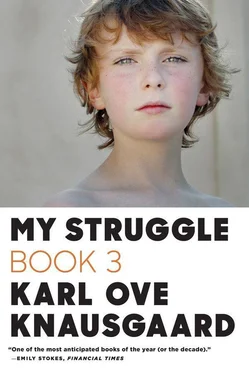“Are you coming, Solveig?” she said.
Solveig nodded and left the line. Both of them came over to us.
“What do you want to do?” Anne Lisbet said.
“Maybe go and look for some bottles?” I said.
“Yes, let’s!” Geir said.
“Where, though? Where are there any bottles?” Anne Lisbet said.
“Along the main road,” Geir said. “And in the forest behind the play area. Around the sheds. Sometimes by the Rock. Never in the autumn, though.”
“At the bus stop,” I said. “And under the bridge.”
“Once we found a whole bag full,” Geir said. “In the ditch near the shop. We made four kroner on the deposits!”
Solveig and Anne Lisbet looked at him, impressed. Even though the bottle idea had been my suggestion! I had come up with it, not Geir!
Without thinking, we had started to walk. The sky was as gray as dry cement. Not a breath stirred the trees; everything was still, brooding, as if turned in on itself. Except for the pines, that is: they were as open and free and sky-embracing as ever. Standing more as though they were in repose. It was the spruces that were turned inward, swallowed up by their own darkness. The deciduous trees, with their thin trunks and splayed branches, were nervous and wary. The old oaks, of which there were quite a few on the slope beyond the road, where we were heading now, were not afraid but lonely. They could endure the loneliness, though; they had stood there for so many years and would stand there for so many more to come.
“There’s a pipe there that goes under the road,” Anne Lisbet said, pointing to the slope running down alongside the road. It was covered with black soil, laid recently, because no flowers had come up yet.
We walked down. And, sure enough, a pipe did go under the road, made of concrete, perhaps a little more than half a meter in diameter.
“Have you ever crawled through it?” I said.
They shook their heads.
“Why don’t we?” Geir said. He leaned over with one hand on the edge of the pipe and peered into the darkness.
“What if we get stuck inside?” Solveig said.
“ We can do it,” I said. “So you can cross the road and wait for us.”
“Do you dare?” Anne Lisbet said.
“Of course,” Geir said. He glanced at me. “Who’ll go first?”
“You can,” I said.
“OK,” he said, bending down and squeezing into the pipe. It was too narrow to scramble through on all fours, I could see, but not so narrow that you couldn’t wriggle through. After a few seconds of twisting and turning his whole body had disappeared. I looked at Anne Lisbet, leaned forward and stuck my head in the pipe. A smell of something fusty, like mildew, filled my nostrils. I placed my elbows on the bottom and edged the rest of my body forward, moving like a grub. When all of my body was inside, I raised myself as far as was possible, and with my forearms, knees, and feet pushing against the cement wriggled into the gloom. For the first few meters I could see the shadowy figure of Geir in front of me, but then the darkness deepened and he was gone.
“Are you there?” I shouted.
“Yes,” he answered.
“Are you scared?”
“A little. And you?”
“Yes, a little.”
Suddenly everything vibrated. A car or a truck must have driven over us a long way up. What if the pipe broke? What if it caved in and we were stuck in it?
The tips of my fingers and toes began to tremble with a faint sense of panic. I knew this feeling, it could arise when I was climbing a mountain and then I would be paralyzed. Frightened out of my wits, I would stand perfectly still, incapable of ascending or descending, in full knowledge of the fact there was only one way to go, only my own movements could get me out of this. I couldn’t move, I had to move, but I couldn’t, had to, couldn’t, had to, couldn’t.
“Are you still scared?” I said.
“A little. Did you hear the car? Here comes another!”
Again the pipe vibrated around me.
I kept quite still. There was water lying in several places at the bottom of the pipe and it was advancing up my trousers.
“I can see light!” Geir said.
I thought of the enormous weight on the pipe. It was only a few centimeters thick. My heart was pounding. Suddenly I wanted to stand upright. The urge grew wildly inside me, but collided with the recognition that it was impossible, the concrete was wrapped around my body like a cocoon. I couldn’t move.
Sometimes Yngve would sit astride me while I was lying under the duvet. He would hold me so firmly that I couldn’t move at all. The duvet was tight across my chest, my hands were locked in his, and my legs were rendered useless under his weight and the taut duvet. He did it because he knew I absolutely hated it. He did it because he knew that after a few seconds of being held captive I would panic. That I would summon all my strength in an attempt to break free, and when I couldn’t, when he held me in his grip, I would begin to scream as loudly as I could. I screamed and screamed like a being possessed, and I was, I was possessed by terror, I couldn’t break free, I was stuck, completely and utterly stuck, and I screamed from the bottom of my lungs.
Now I could feel the same grip around my heart.
I couldn’t move.
Panic was growing.
I knew I mustn’t think about not being able to stand up, I should crawl forward patiently and everything would be fine. But I couldn’t. All I could think of was that I couldn’t move.
“Geir!” I shouted.
“I’m nearly out!” he shouted back. “Where are you?”
“I’m stuck!”
Silence for some seconds.
Then Geir shouted, “I can come and help you! I just have to get out and turn first!”
The panic attack was like an exhalation of breath, because it was out of me now. I moved my arms forward and dragged my knees after. The material of my jacket scraped against the pipe above. Only a few centimeters above that there were tons of rocks and earth. I stopped. My legs and arms had gone weak. I lay down flat.
What would Anne Lisbet and Solveig think about me now?
Oh no, oh no.
Then the panic returned. I couldn’t move. I was trapped. I couldn’t move! I was trapped! I couldn’t move!
Somewhere in the darkness in front of me something moved. Cloth scraped against cement. I heard Geir breathing, it was unmistakable: he would often breathe through his mouth.
Then I saw him, a white face in the blackness.
“Are you stuck?” he said.
“No,” I said.
He grabbed the sleeve of my jacket and pulled. I raised my back and moved first one arm forward, then the other, one leg, then the other. Geir wriggled backward without letting go of my sleeve, and even though he wasn’t pulling me, because of course I was scrabbling my way through, it felt like he was, and the sight of his white face, pointed like a fox’s and unusually concentrated, meant that my mind was no longer on the pipe and the darkness and not being able to move, and so I could move, little by little over the damp concrete, which became lighter and lighter until Geir’s feet were out of the hole, followed by his torso, and I could poke my head out into daylight.
Anne Lisbet and Solveig were standing close together by the opening and looking at me.
“Did you get stuck?” Anne Lisbet said.
“Yes,” I said. “For a while there, but Geir helped me.”
Geir brushed down his hands. Then he brushed the knees of his trousers. I straightened up. The space beneath the gray sky was vast. All the shapes were razor sharp.
“Why don’t we go down to Little Hawaii?” Geir said.
“Good idea,” I said.
It was wonderful to run on the forest floor. The surface of the water in the little lake was completely black. The trees rising from the two small islands were still. We jumped over to our respective islands. Anne Lisbet and I on one, Solveig and Geir on the other.
Читать дальше












